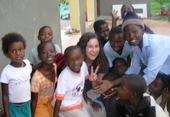Life Skills Training
For three days of my in-service training we had a counterpart from our village, in my case Lucy Modjadji a 1st grade teacher at Letseku, come to Polokwane to experience Life Skills training that we can implement back in our village.
I have had some faulty training from Peace Corps in my past, but the three days of Life Skills training taught me more about South Africans than I had understood in all my previous time spent here. All of my earlier assumptions had been made through observations, so this was the first time that I delve into real and serious issues with the people that work in the village through face to face interactions. By discussing topics such as values, HIV/AIDS, gender roles, knowledge, assertiveness versus passivity, making good decisions, and self-esteem I came to realize the actuality of our cultural differences.
My methods often don’t work: not because people don’t want them to, but more importantly, because they don’t understand them or are overwhelmed by them. It seems apartheid has made many people passive or scared of change. While I deal with conflicts and problems head on, no holding back, culturally my counterparts like to avoid clashes. So when discord was introduced into our group via discussions and/or hard questions it was interesting to see a shift take place as people opened up more in the “safe setting” we had in front of us. One of the best discussions we had centered around the “question of the day:” HIV positive people should be required by law to inform their partner.
I often find myself frustrated with South Africans. I’m used to getting things done the fastest, in my opinion, most efficient way possible. Yet, for things to be more effective here they need to occur gradually. Emphasis in the village is placed on trust and relationships much more so than in America. I suppose this is the reason why meetings are catered even when there is little money for food. There is stress placed in showing respect and one-way people do that here is by providing meals.
Overall, I think I’ve seen the importance of patience. I’m not ineffective at my job I just need to fine-tune myself to fit into my job description. I would like to get a lot done as quickly as possible, but the culture I reside in doesn’t work that way. For me to constantly clash with the standardized norms is ineffective and only causes pains to myself. It has taken me four and a half months at site to gain a deeper understanding of the people around me. I may have to wait another four and a half for them to have the same understanding of me. Gradually, patiently, eventually…
I have had some faulty training from Peace Corps in my past, but the three days of Life Skills training taught me more about South Africans than I had understood in all my previous time spent here. All of my earlier assumptions had been made through observations, so this was the first time that I delve into real and serious issues with the people that work in the village through face to face interactions. By discussing topics such as values, HIV/AIDS, gender roles, knowledge, assertiveness versus passivity, making good decisions, and self-esteem I came to realize the actuality of our cultural differences.
My methods often don’t work: not because people don’t want them to, but more importantly, because they don’t understand them or are overwhelmed by them. It seems apartheid has made many people passive or scared of change. While I deal with conflicts and problems head on, no holding back, culturally my counterparts like to avoid clashes. So when discord was introduced into our group via discussions and/or hard questions it was interesting to see a shift take place as people opened up more in the “safe setting” we had in front of us. One of the best discussions we had centered around the “question of the day:” HIV positive people should be required by law to inform their partner.
I often find myself frustrated with South Africans. I’m used to getting things done the fastest, in my opinion, most efficient way possible. Yet, for things to be more effective here they need to occur gradually. Emphasis in the village is placed on trust and relationships much more so than in America. I suppose this is the reason why meetings are catered even when there is little money for food. There is stress placed in showing respect and one-way people do that here is by providing meals.
Overall, I think I’ve seen the importance of patience. I’m not ineffective at my job I just need to fine-tune myself to fit into my job description. I would like to get a lot done as quickly as possible, but the culture I reside in doesn’t work that way. For me to constantly clash with the standardized norms is ineffective and only causes pains to myself. It has taken me four and a half months at site to gain a deeper understanding of the people around me. I may have to wait another four and a half for them to have the same understanding of me. Gradually, patiently, eventually…


0 Comments:
Post a Comment
<< Home